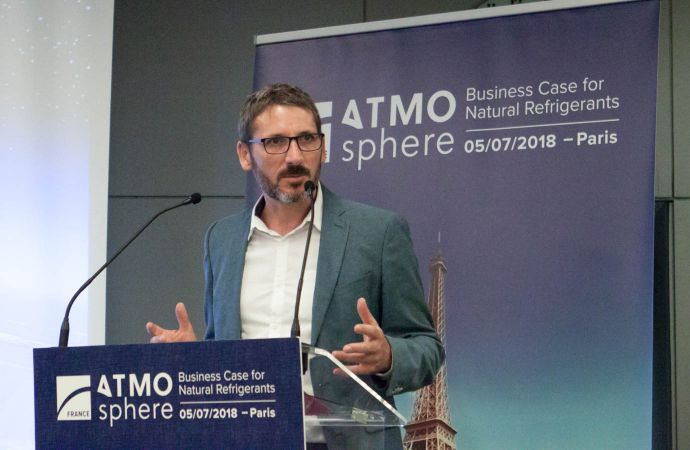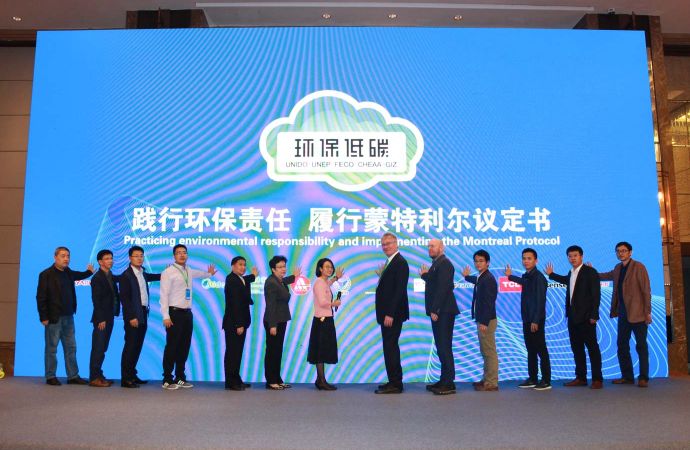Policy initiatives such as France’s upcoming tax on HFCs can help to bring natural-refrigerant technologies to market, heard ATMOsphere France participants.

French MP Matthieu Orphelin addresses ATMOsphere France in Paris last Thursday.
As HFC prices skyrocket and the enforcement of an HFC tax draws ever nearer, ATMOsphere France participants last week (5 July) heard how policy initiatives can help them to bring natural refrigerant-based HVAC&R technologies to market more quickly.
Kicking off the policy discussion, French member of parliament (MP) Matthieu Orphelin confirmed that the tax would most likely enter into force in January 2019. “I’m convinced that the government will include the tax in the 2019 finance bill,” Orphelin said.
The MP highlighted the French government’s determination to be an environmental leader on the international scene, reminding the audience of the role that can be played by the HVAC&R industry in delivering that vision. “1 kg of HFCs released into the atmosphere corresponds to 10,000 km of driving by car,” Orphelin said.
The tax “is about giving industry a progressive signal of the trajectory that we’re on. We’re introducing this tax progressively. The technologies are already out there. It’s not about experimenting with new technologies. It’s about giving the market a signal that this is the direction we’re taking – it’s the role of the state to do this,” the MP said.
“In France’s Plan Climat, the carbon tax – and thereby the HFC tax – has an important role to play,” Orphelin said. “The HFC tax is not an extra tax. It’s designed to favour the most environmentally friendly options. Look at the example of subsidies for cleaner cars. Taxes move the market.”
“We’ve got international and European agreements on HFC emissions to live up to. We need to move faster. The HFC tax in the Plan Climat is about moving forward on this,” Orphelin said.
It’s about giving the market a signal that this is the direction we’re taking – it’s the role of the state to do this.”
– French MP Matthieu Orphelin on the HFC tax
Revise standards for natural refrigerants to fulfil their potential
Marie Battesti, policy analyst at shecco – publisher of this website – gave an overview of f-gas policies around the world and shed light on how natural refrigerants are benefiting from these measures.
“Legislation is essential to put industry under pressure to move away from high-GWP HFCs,” Battesti said. “The progressive reduction of HFCs will increase their price worldwide, helping to develop the market for natural refrigerants. Standards revision is essential to allow natural refrigerants to fulfill their potential.”
Regarding restrictive codes in France that currently ban the use of flammable refrigerants in open-access buildings (Établissements Recevant du Public, ERP), Battesti said: “The ERP fire safety regulation in France restricts the adoption of hydrocarbons. In other countries, such as Denmark, regulation is actually promoting the uptake of natural refrigerants – for example via an HFC tax.”
The progressive reduction of HFCs will increase their price worldwide, helping to develop the market for natural refrigerants.”
– Marie Battesti, shecco
EU-funded programmes
Ina Colombo from the International Institute of Refrigeration closed the policy panel session with a presentation on European Union-funded training programmes for natural refrigerants.
“Three billion cooling systems are installed worldwide. The HVAC&R sector employs 12 million people. 17% of the world’s electricity consumption is on cooling,” Colombo said, highlighting the critical need to train technicians to match the fast pace at which legislation and technology is changing.
Colombo explained how EU-funded programmes such as SuperSmart and REAL Alternatives can help technicians to receive free training on natural refrigerants.
SuperSmart is a programme led by shecco designed to hasten uptake of energy-efficient, low-GWP refrigeration, heating and cooling solutions for Europe’s food retail sector. The programme provides free training sessions for food retailers and suppliers of HVAC&R systems.
REAL Alternatives provides learning programmes on natural refrigerants too; a mix of e-learning, face-to-face, training materials, practical exercises, assessments and an e-library of learning resources.
The first-ever ATMOsphere France conference took place at the Intercontinental Paris Marceau hotel in the French capital on 5 July 2018, bringing together French HVAC&R market stakeholders from across the supply chain.
Related stories




